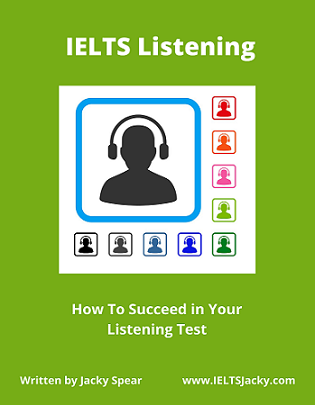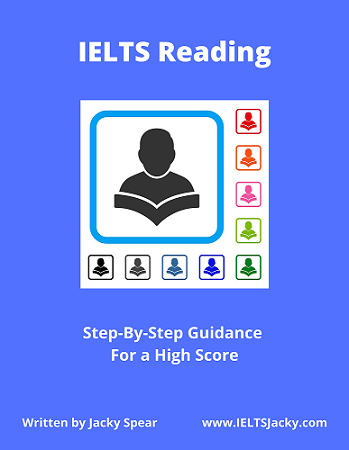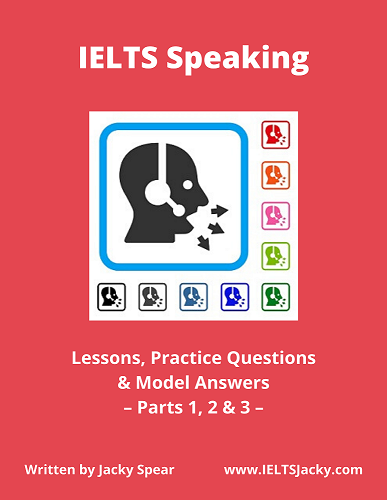IELTS Listening Sample
Table Completion
The IELTS
Listening sample in this lesson is a table completion question. These come up
regularly and can appear in any section of the test.
Table completion questions are gap fill questions that require you to fill in missing words. The table will be made up of columns and rows containing information.
Generally, tables categorise information, that is, they group pieces of information that are related in some way or share the same features.
The subject matter could be almost anything but as long as you have a good strategy to follow, you’ll be able to answer any question you’re given. Follow the advice in this lesson and you’ll be well prepared.
The lesson includes:
- Sample questions
- Strategy & tips
- Vocabulary
- Practice question
- Answers
Here are two IELTS Listening sample questions from past papers.
IELTS
Listening Sample – Question 1
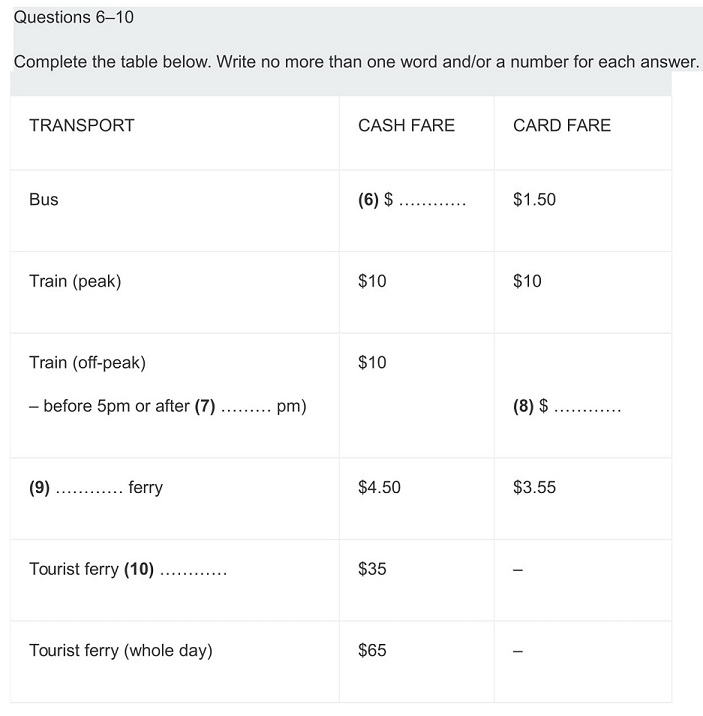
Source: British Council website
The recording for this sample question is a telephone conversation between a clerk at the enquiry desk of a transport company and a man who is asking for travel information. You are required to fill in the missing information about the cost of fares for bus and train journeys from Bayswater to Harbour City.
IELTS
Listening Sample – Question 2
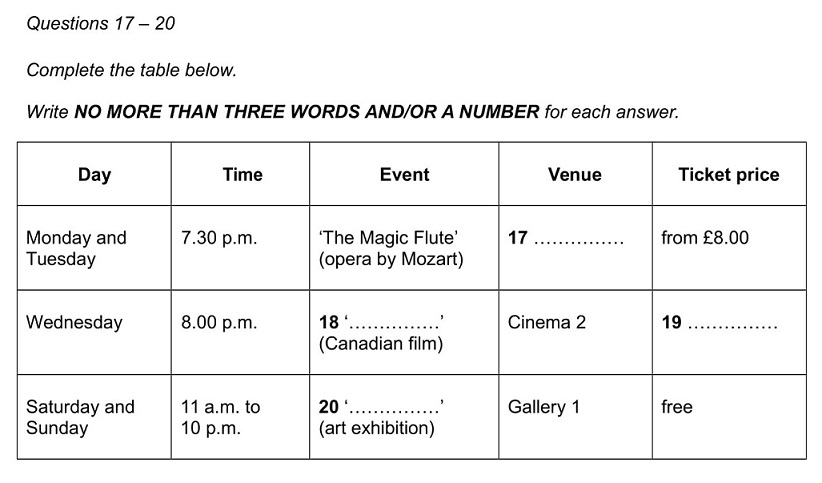
Source: Official IELTS website www.ieltsessential.com
The recording for this sample question is a radio broadcast about The National Arts Centre. You are required to fill in four pieces of missing information about the centre.
I’m going to use this second example to teach you the answer strategy and give you tips and advice on how to overcome the challenges presented by this type of question.
Strategy & Tips
You will have a short time to prepare before the speaker begins talking. Use this time to familiarise yourself with the question and focus your mind on what you need to listen out for.
1) Read the instructions
Read the instruction carefully, paying particular attention to how many words you are allowed to write for the answer.
The instructions for our sample question state that you must,
Write NO MORE THAN THREE WORDS AND/OR A NUMBER for each answer.
If you write more than three words, your answer will be marked incorrect even if the information you give is correct.
The first sample question I showed you stated that you must,
Write NO MORE THAN ONE WORD AND/OR A NUMBER for each answer.
So, the number of words allowed does vary between questions. Don’t get caught out.
2) Answer order
The answers will come in the same order in the recording as they are listed in the question so, for this question, you will hear answer 17 first, then answer 18 and so on. This makes it easier to pick out the answers than if they were in a random order.
3) Look at column headings
The columns in
the table will have headings that tell you what type of information each column
contains. It is essential to read these during your preparation time as they
will help you to understand the table and give you a big clue as to what sort
of information will be contained in the recording.
The column headings in our IELTS Listening sample question are:
Day Time Event Venue Ticket price
4) Predict
the answers
The
information in the column headings, as well as the rest of the table, will
enable you to predict what the answers might be before you listen to the
recording.
It's important to make predictions as this will focus your mind on what to listen out for in the recording.
Occasionally, you’ll be able to predict the actual word but most often, it will be the type of information that you’ll be able to determine. The answers to table completion questions will usually be factual information such as names, places, dates, times and prices.
Any clues you can get will help you to understand the recording and identify the information needed for the answers.
Have a go at predicting some of the answers in our practice question. There are 4 answers to fill in (17-20). Then have a look at my predictions below.
Here is the IELTS Listening sample table with the missing information.
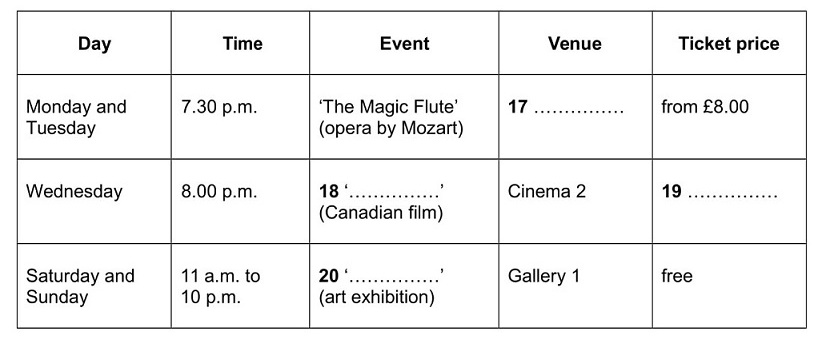
Predictions:
17 – name of a room or facility
18 – name of a film
19 – a price in £
20 – an exhibition title
You can see that just a few seconds spent making predictions can give you a lot of information about what you need to listen for in the recording. This will greatly improve your chances of identifying the correct answers.
While you're listening to the recording, listen out for the information that comes before the answer you're waiting for as it appears in the table. These are the key words you need to identify.
For example, for answer 17, listen out for the speaker talking about Mozart’s opera ‘The Magic Flute’. The place (venue) where it will be performed will probably come in the same sentence or the next one.
5) Synonyms and paraphrasing
In all types of Listening questions, you need to listen out for synonyms and paraphrasing. These are something else that you may be able to predict.
If you have time before the recording starts, scan the question to identify key words or phrases that are likely to be replaced by synonyms and think of some that might be used.
Two that stand out are:
Word(s) in table: Possible synonym:
Saturday and Sunday weekend
price cost
As you’re listening to the recording, remind yourself that you are not only looking for the exact words as they are used in the question but words and phrases that have the same meaning.
We’ll look at some synonyms that have been used in this question when we review the answers.
6) Problematic vocabulary
There are 6 types of vocabulary that can cause particular problems for students and some of them will definitely be present in table completion questions, as we've just seen. The 6 types are:
- Time
- Numbers
- Prices
- Dates
- Letters
- Addresses
You must be able to recognise them in speech and to write them correctly in your answers.
I’ve written a whole lesson on this topic, including 8 listening exercises to help you recognise & learn these types of vocabulary. Follow this link to the lesson: Vocabulary Lesson & Exercises
7) Watch out for distractors
The examiners will try and catch you out with distractors. A distractor is a word or a phrase that changes or corrects the original piece of information given. So, you may be given an answer and then have it taken away again.
Here are some sample sentences containing distractors. I’ve highlighted the relevant words.
- The leaflet states that the sculpture exhibition is in Gallery 1 but it is, in fact, in Gallery 2.
- The usual price of cinema tickets is £5.50. However, the cost of attending the special screening of ‘Great Expectations’ on Monday evening is reduced to £4.50.
- The performance of ‘The Magic Flute’ by Mozart starts at 7 p.m. No, sorry. The doors open at 7 o’clock but the curtain goes up at 7.30.
The use of ‘but’ and ‘however’ are particularly common distractors but there are many different words and phrases that can be used to change or correct a piece of information so be alert for them.
8) Guess if necessary
My final tip is to never leave a blank space on the answer sheet. If you miss an answer, take an educated guess. This gives you at least some chance of getting it right. Don’t stress about a missed answer or it will affect your ability to answer the next set of questions. Just make your choice and move on.
Practice Activity
It’s now time for you to practice using this strategy on our
sample question. Here it is again.
IELTS Listening Sample Question

Listen to the recording and answer the question. Refer back to the strategy as you need to and keep the predictions in mind. When you’ve completed the practice activity, go through the answers below.
IELTS Listening Sample – Table Completion – National Arts Centre Recording Part 2
Source: Official IELTS website www.ieltsessential.com
This is the second part of the full recording about the National Arts Centre. Part 1 is the audio for a Note Completion Question (Click to study the lesson on it.). If you want to listen to the whole recording to better understand the context of the topic, listen to the full recording below:
IELTS Listening Sample – National Arts Centre Full Recording
Source: Official IELTS website www.ieltsessential.com
Answers
Answers:
17 (the)
Garden Hall
18 Three Lives
19 £4.50
20 Faces of China
We’ll now look at them in
context and examine the language that has been used.
Answer 17: (the) Garden Hall
Here’s the section this answer appears in:
If you’re interested in classical music, then we recommend that you go along to the National on either Monday or Tuesday evening at 7.30 for a spectacular production of ‘The Magic Flute’, probably the most popular of all Mozart’s operas. It’s in the Garden Hall…
Earlier, I recommended that you should listen out for the information (key words) that comes before the answer in the table, that is, mention of Mozart’s opera ‘The Magic Flute’. As I suggested, answer 17 comes immediately after this:
It’s in the Garden Hall
This is the name of a room or facility as we predicted. Names of places are proper nouns so must be written with a capital letter at the start of each word. If you don’t do this, your answers will be marked wrong.
If you're concerned that you'll forget, write all your answers for the Listening test in capital letters.
Answer 18: Three Lives
Here’s the section this answer appears in:
For those more interested in the cinema, you might like to see the new Canadian film which is showing on Wednesday evening at 8 p.m. in Cinema 2. And that’s called ‘Three Lives’.
Again, all the key words from the table are in the sentence preceding the answer so you should have been able to identify it quite easily.
Remember to use capital letters for this answer as well.
Answer 19: £4.50
Here’s the sentence this answer appears in:
Tickets cost just £4.50 which is a reduction on the usual price of £5.50.
A synonym is
used in this sentence:
- ticket cost à ticket price
It also contains a distractor which could catch you out if you weren’t listening very carefully, especially as the key word from the table (price) comes before the incorrect price (that is, the usual price), is given.
Tickets cost just £4.50 which is a reduction on the usual price of £5.50.
Answer 20: Faces of China
Here’s the sentence this answer appears in:
But you can see the centre’s main attraction at the weekend because on Saturday and Sunday, 11 a.m. to 10 p.m. they’re showing a wonderful new exhibition that hasn’t been seen anywhere else in Europe yet. It’s a collection of Chinese art called ‘Faces of China’.
Key words from the table are replaced with a synonym in the information preceding this answer:
weekend à Saturday and Sunday
although the two days are mentioned as well.
There is also an example of paraphrasing:
a collection of Chinese art
which means the same as ‘a Chinese art exhibition’.
This paraphrasing makes it a little more difficult to identify this answer but all the clues are there if you listen carefully.
If you got any
of the answers wrong, listen to the IELTS Listening sample recording again and
see if you can pick them out now that you’re more familiar with the text.
I hope you’ve found this lesson helpful. Now practice using this strategy to do some table completion practice with other past questions. It’s only with practice that your skills will improve and you’ll get the score you need in your test.
You'll find
lessons on how to answer other types of Listening questions in the menu below.
Want to watch & listen to this lesson?
Click on this video.
IELTS Listening – All Lessons
IELTS Listening Test – Understand the format & question types. Know what skills are assessed. Also, discover 3 important marking tips.
Listening Strategies – Learn 3 essential listening strategies – question analysis, answer prediction & how to use keyword clues.
Listening Skills – Learn the 4 key listening skills needed for a high score highly. Examples from real questions.
Listening Exercises – 8 listening exercises to help you recognise & learn vocabulary for 6 common topics – time, numbers, prices, dates, letter names & addresses.
The 10 Question Types – Examples of all 10 types of Listening questions. Learn how to recognise & understand them. Links to 10 step-by-step lessons.
Listening Tips – Top 10 tips to bring you success in your Listening test. Essential information you need to know to achieve a high score.
How to Improve Your Listening Skills – 6 simple strategies essential for achieving a high score in the test.
Listening Practice – 4 practice techniques to develop your listening skills
Map & Plan Vocabulary – Learn the vocabulary you need for your test. 5 maps & plans with sample sentences containing common vocabulary of location & direction.
Listening Practice Samples – Short activities to improve your listening skills & help you learn topic vocabulary.
Genuine Full Practice Tests:
The 10 Question Types
Click the links below to learn how to answer each type of question.
All lessons include IELTS Listening samples.



